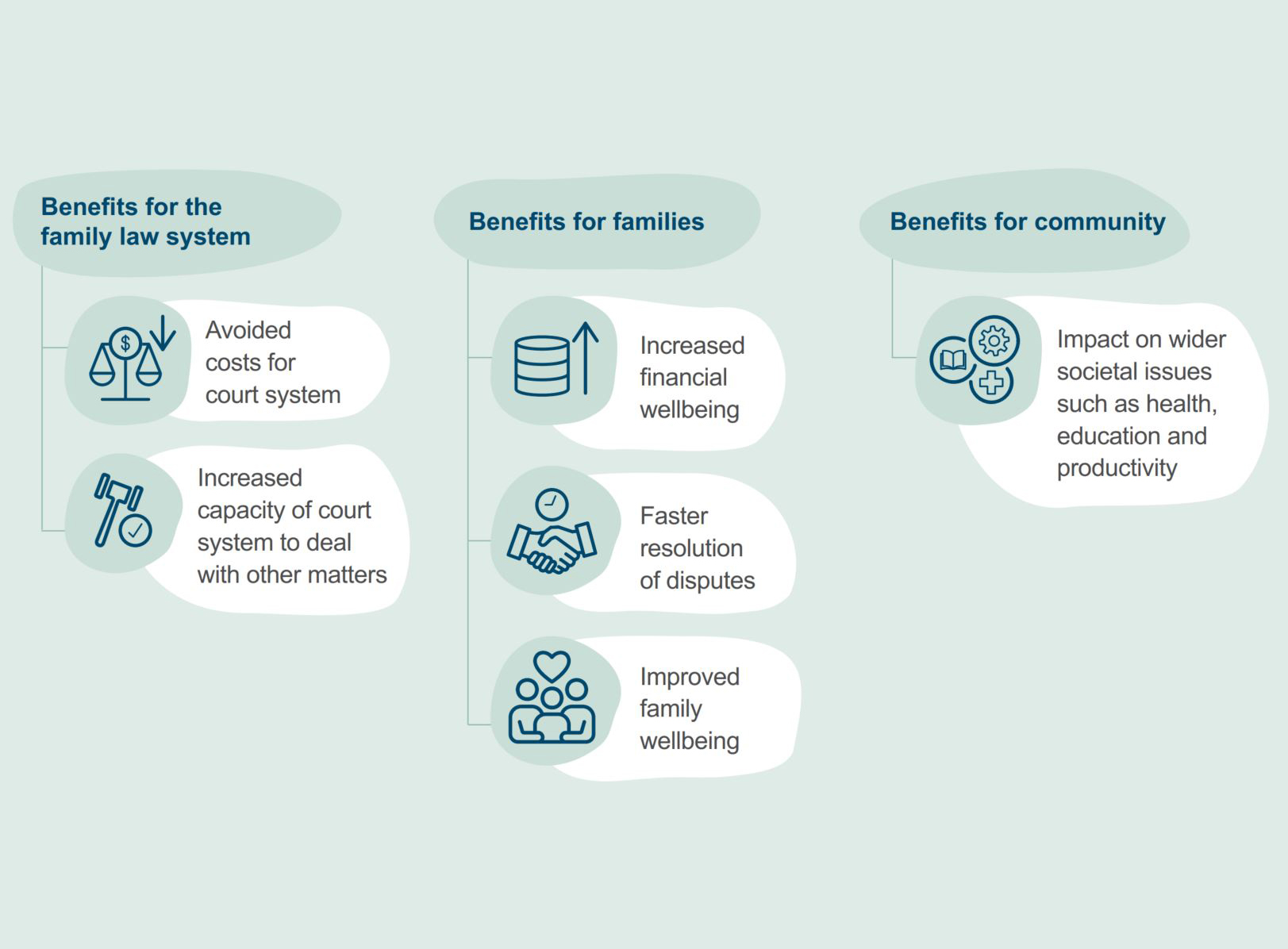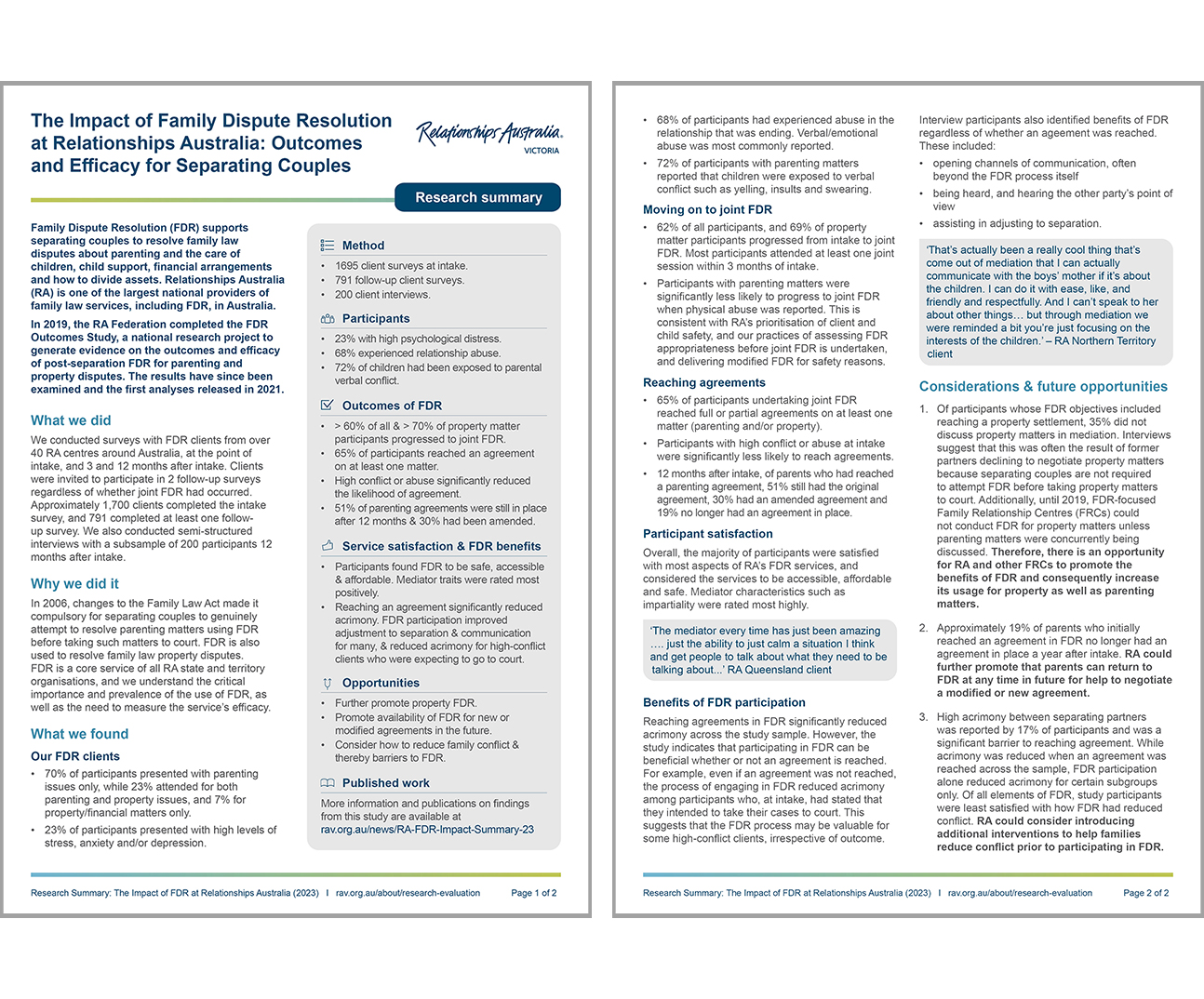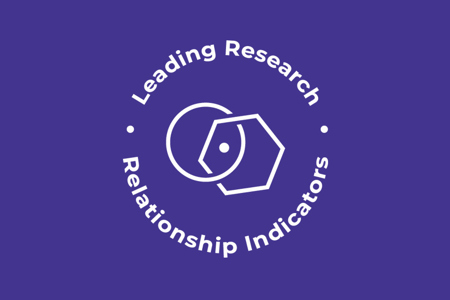
Family dispute resolution: What the research says
How do we know that family dispute resolution helps families? Our research backs it up.
Through continuous research and evaluation, we continue to refine family dispute resolution (FDR) and demonstrate the profound and positive impact it has on clients and their families. On this page you can read about our research in the following areas:
- FDR for clients intending to go to court: More than just a tick-box exercise?
- Analysing the costs and benefits of FDR
- FDR outcomes for Relationships Australia clients
- Can post-separation co-parenting apps help families avoid conflict?
- How are communication technologies used and misused after separation?
- Legally-assisted FDR with community legal centres
- Hearing children's voices: Supporting child-inclusive practices in FDR
- AccessResolve property dispute resolution for court-ordered clients: Satisfaction and outcomes
If you're interested in attending FDR, visit our service page.
FDR for clients intending to go to court: More than just a tick-box exercise?
Separating parents are legally required to try FDR for parenting disputes before they can go to court. This can mean that FDR can sometimes be seen as a ‘tick-box’ exercise for parents who have no expectation of negotiating an agreement. With this knowledge we asked the question: Is FDR still valuable for these clients?
In 2023–24, we conducted new analyses with data from our national Relationships Australia FDR Outcomes Study 2017–2019. We explored the outcomes of FDR for all 704 parents in the full sample, and compared these to the outcomes for a subgroup of 126 parents who told us during intake they wanted a certificate to proceed to court to resolve their parenting disputes.
What we found

Over half (57.5%) reached an agreement on at least one issue.

Almost three-quarters (73.2%) were satisfied with the FDR process.

Hostility and ill-will reduced even if parents didn’t reach an agreement.
Analysing the costs and benefits of FDR
Cost–benefit analysis is a comprehensive and evidence-based method for systematically evaluating the economic, social and environmental impacts of programs. In 2024, we advanced our project to demonstrate the value and impact of our FDR service, as well as report outcome measurement and qualitative data.
The results of this project will guide the delivery of effective and cost-effective services, and allow us to articulate the impact of our programs within the sector and to government. It will also support us to illustrate the value of services to clients that, in turn, will help them to evaluate and make informed decisions about services and how to resolve their family law disputes.

We continue to work with data from the Relationships Australia FDR Outcomes Study 2017–2019, which is a national project on the outcomes and efficacy of post-separation FDR for parenting and property disputes. In 2023 we investigated whether a shorter version of an existing 25-item ‘acrimony scale’ developed in the 1980s to measure conflict between separated parents could be beneficial in research and practice.
We developed and validated short scales measuring relationship hostility and parental co-operativity. These may be used to measure both the extent of negative feeling between separated parents and the capacity to work around this in the best interests of children.
This capacity is important to the success of FDR, and it may be useful to know whether clients are ready to negotiate or need more preparation first. This process and its outcomes were published in the Journal of Divorce & Remarriage in August 2023.

Can post-separation co-parenting apps help families avoid conflict?
We continue to translate the outcomes of our Australian Research Council Linkage Grant research project on the role of post-separation co-parenting apps in reducing conflict.
We presented at the 2023 Partnership of Victorian FRCs’ Good Practice Forum, and had a fourth article on the research published in the International Journal of Law, Policy and the Family.
Using this research, we also created a short information sheet in 2024 to help separated parents make an informed choice about whether using an app is right for them.

How are communication technologies used and misused after separation?
We’re disseminating findings from our study on the use and misuse of communication technologies among post-separation clients, including which technologies are used by our clients, how they are positively and negatively experienced, and why some technologies are preferred over others.
The results, which are outlined in our research summary below, can assist our sector and the legal sector in promoting positive co-parenting communication habits and tools.
Our peer-reviewed journal article on the outcomes was published in the international Journal of Social Welfare and Family Law in September 2024.

Legally-assisted FDR with community legal centres
Some clients are unable to participate in the mainstream model of FDR, due to issues such as family violence, unequal bargaining power or other vulnerabilities. Having the support and assistance of a lawyer during FDR can support such clients to resolve their family law differences without proceeding to court. In order to identify the value of lawyer assistance in FDR for clients, in 2023-24 we continued our study of our legally-assisted FDR service that is provided in Sunshine in conjunction with community legal centres.
Key results included clients’ reports that their lawyer’s presence helped them to focus on their children’s needs (80%), understand their position (89%), and respond to proposals (87%), and avoid high legal costs (83%). Such outcomes support clients to consider proposals made in FDR in the context of likely court outcomes, costs and time frames and, as a result, can support clients to reach agreements without proceeding to court.
‘I came into the meeting so anxious; I finished the meeting feeling so good. I felt like I had someone on my side. I had some support, but both parties were completely taken into consideration and everything was just dealt with… with such ease, and I was so thankful.’
- Legally-assisted FDR client
Hearing children's voices: Supporting child-inclusive practices in FDR
We strongly believe that children should have a say in post-separation parenting arrangements, as their involvement benefits their wellbeing and sense of autonomy during and after family breakdown. In November 2023, we produced a report on children's voices in FDR through child-inclusive practices, which mapped different models of child advocacy in mediation. The results will support the increased use of child-inclusive practices in FDR within our organisation, and will be shared more broadly with the sector.
'We have found nothing but unequivocal support, including from our own practitioners, for the legal and ethical imperative to increase and improve the ways in which children are heard in post-separation parenting arrangements.'
- Genevieve Heard, Manager Research, and Melody Velasquez-Tan, Research and Evaluation Officer
AccessResolve property dispute resolution for court-ordered clients: Satisfaction and outcomes
AccessResolve is RAV’s property conciliation service for court-ordered clients. Although it supports a relatively high-conflict cohort of clients, it records strong settlement rates of over 70%.
From April 2019 to October 2020 we undertook to evaluate AccessResolve with a view to whether client satisfaction, practitioner impartiality and client self-determination could be achieved when conciliation was court-ordered.
What we found

78% were ‘very much’ or ‘somewhat’ satisfied with the way their conciliation was carried out.

90% said their practitioner was ‘very much’ or ‘somewhat’ impartial and even handed.

82% felt 'very much’ or ‘somewhat’ able to express their point of view in conciliation.
Read more about our research and evaluation work

Research and evaluation
Read about our evidence-informed approach, view our Theory of Change video and download our Social Impact Report.

Current projects
We're currently undertaking research and evaluation projects across a range of areas related to family relationships.

Our dedicated research and evaluation team
Driving collaborative design, development and implementation of our outcome measurements and evaluations.

Presentations, webinars and publications
We're committed to knowledge sharing and contributing to sector-wide continuous improvement. We regularly share our research and evaluation learnings at conferences and events and through webinars and podcasts.

Previous projects
For over a decade, we've conducted a wide range of research and evaluation projects, including major projects funded by the Australian Research Council.

Research and evaluation summaries
These summaries are designed to share the outcomes of key projects and initiatives relating to our services, clients and community needs.

Relationship Indicators 2022
View the results of our nationally representative survey into the state of relationships in Australia.